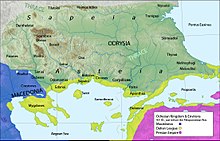

Sapaeans, SapaeiorSapaioi (Ancient Greek, "Σαπαίοι") were a Thracian[1] tribe close to the Greek city of Abdera. One of their kings was named Abrupolis [2] and had allied himself with the Romans. They ruled Thrace after the Odrysians until its incorporation by the Roman Empire as a province.[3]

| Rhoemetalces SAPAEAN KINGS | |||||||||||||||||||||||||||||||||||||||||
| Cotys I (Sapaean) | |||||||||||||||||||||||||||||||||||||||||
| Mark Antony ∞ Antonia Hybrida | Rhescuporis I (Sapaean) | Rascus | |||||||||||||||||||||||||||||||||||||||
| Antonia ∞ Pythodoros of Tralles | Cotys II (Sapaean) | ||||||||||||||||||||||||||||||||||||||||
| Pythodorida of Pontus ∞ Polemon I of Pontus | Rhoemetalces I ∞ Pythodoris I | (woman) ∞ Cotys VII ASTAEAN KINGS | Rhescuporis II (Sapaean) | ||||||||||||||||||||||||||||||||||||||
| Antonia Tryphaena | Cotys III (Sapaean) | Rhoemetalces III 38-46 | |||||||||||||||||||||||||||||||||||||||
| Rhoemetalces II 19-38 | Gepaepyris ∞ Tiberius Julius Aspurgus king of Vosporus | Cotys IX king of Lesser Armenia | Pythodoris II | ||||||||||||||||||||||||||||||||||||||